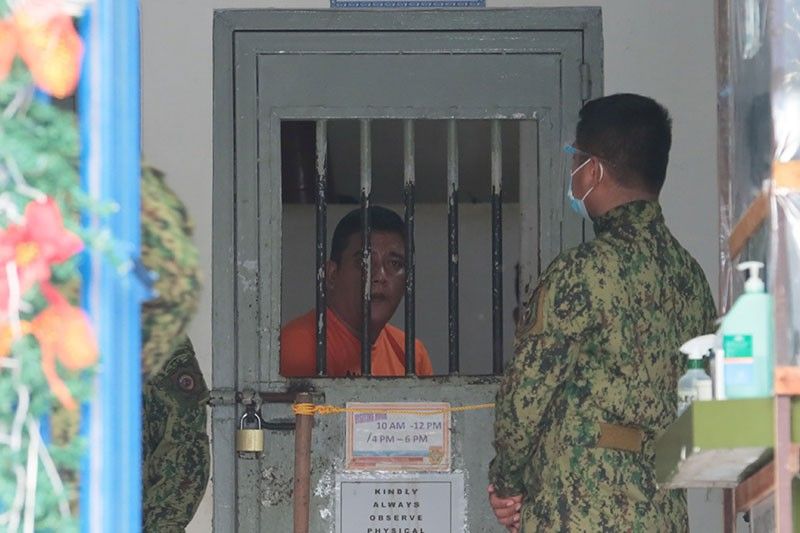More killings? Proponents use Paniqui murders to renew calls for death penalty

MANILA, Philippines — Those pushing for the revival of death penalty in the country were quick to use the Paniqui shooting in renewing their call to bring back capital punishment, a move that critics say won't deter crimes unless reforms in the criminal justice system are carried out.
The brutal murders of Sonya Gregorio and her son Frank Anthony by a cop have stirred outrage across the Philippines amid a supposedly festive season of Christmas.
Lawmakers have called for a probe, but the Duterte administration has insisted that it was only an isolated incident, despite the president repeatedly saying he has no regard for human rights and that he will back his police even if involved in killings.
On Tuesday, pro-administration senators Manny Pacquiao and Ronald Dela Rosa renewed their call to restore death penalty, anchored on the unsubstantiated claim that it would be effective in preventing crimes and serve justice to victims.
"Sino pa ang gustong pumatay ng tao kung alam niyang papatayin din siya via death penalty?" said Dela Rosa, who is Duterte's ex-police chief who carried out the anti-drug war that has seen thousands killed, as reported by ABS-CBN News.
(Who would kill a person if he knew that he too would be killed through the death penalty?)
The said proposal had been an important piece in Duterte's presidential run in 2016, part of his promise to eradicate criminality in three to six months which had visibly failed to become a reality, as is shown in the series of killings alone over the previous months.
Human rights watchdog Amnesty International had disputed as myth the logic that death penalty deters crimes and makes societies safer, based on evidence across the world.
"Far from making society safer, the death penalty has been shown to have a brutalizing effect on society. State-sanctioned killing only serves to endorse the use of force and to continue the cycle of violence," the group said.
Add to that, a 2009 survey among criminologists also found that 88% of them do not believe that death penalty is the effective way to curb criminality.
At home, human rights advocates have instead pushed for improving the justice system instead of the capital punishment's return.
Lawyer Chel Diokno of the Free Legal Assistance Group told a congressional hearing that per a survey they conducted in 2004, 73% of those in the death row were poor and iliterate. Some 81% also had low-income jobs before they were arrested and convicted.
Constitutional law professor Theodore Te has said too that a punishment as "perfect" as death penalty has no place in a justice system plagued by many problems.
“It (death penalty) is the most perfect, most absolute, final penalty but it... exists within a system that is far from perfect, far from near perfect,” said the former Supreme Court spokesman.
There is also the concern that the Philippines would violate international treaties it has ratified in the past should death penalty be restored, with consequences seen ahead.
Duterte has since distanced himself from the Paniqui incident, calling instead the culprit Jonel Nuezca as mentally ill, while his officials say the murders are not a cause for reforms.
But for other lawmakers, death penalty is not the solution to ending the rampant killings but instead, addressing a culture which they said the president has allowed for. It is worth mentioning as well that those pushing for capital punishment have made no mention of reforms within the police, which had figured in documented cases of brutality this 2020.
"[It] is not the re-imposition of the death penalty, which is a brutal violation to the right to life...but the dismantling of the culture of violence which no less than the Duterte administration has encouraged, tolerated and condoned," said Rep. Edcel Lagman (Albay).
"This impunity and disregard for the rule of law cannot be remedied by death penalty but with our return to the reign of justice," said Rep. Ferdinand Gaite (Bayan Muna) in a separate statement. "Instead of using this to opportunistically push the agenda of re-instituting death penalty, this must be used to end the state policy of extrajudicial killings."
Nuezca had since been charged with two counts of murder for the grisly killings. Before he shot dead the Gregorios, it was found that he had also faced previous administrative and criminal charges, which only put more question on how he was still allowed to carry a weapon, and let alone stay in the police force.
But the incident is only among a string of cases involving policemen after the killing of retired military officer Winston Ragos in April, among others.
And with no reforms seen within the PNP amid a lack of acknowledgement that shortcomings have to be addressed, it is feared that such will likely go on.
- Latest
- Trending

































